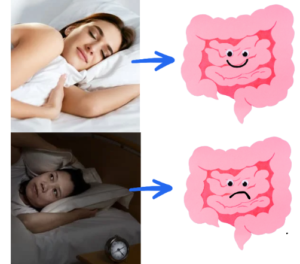Understanding the Crucial Relationship Between Quality Sleep and Digestive Health
Sleep serves as more than just a restorative period; it plays a crucial role in influencing our digestion. Though the link between sleep and digestive health may not be immediately obvious, it encompasses a host of physiological processes that function together seamlessly. The body’s circadian rhythm, often referred to as the internal biological clock, coordinates both our sleep cycles and digestive functions. This synchronisation is why many individuals experience hunger at similar times each day, reflecting how our bodies are finely tuned to align with natural biological patterns.
The Indispensable Role of Restful Sleep in Enhancing Digestive Function 
Sleep is essential for the body’s ability to heal, rejuvenate, and restore itself. Particularly during the deeper stages of sleep, the body undergoes critical restorative processes. In these profound stages, the organs, tissues, and cells that constitute the digestive system not only relax but also engage in vital repair mechanisms. The body focuses on cellular repair and growth during deep sleep, with particular emphasis on regenerating cells that line the gastrointestinal tract, which endure constant wear from food particles and digestive enzymes. This regeneration is fundamental for maintaining the integrity of the gastrointestinal lining, thereby enhancing the effectiveness of digestion.
Deep sleep also plays a significant role in strengthening the immune system, which is particularly important for the digestive system as it contains unique immune cells activated by the beneficial bacteria residing in the gut. These immune cells are vital for protecting the gut and the overall digestive system from harmful microorganisms, thereby ensuring a balanced community of bacteria within the gut environment.
Moreover, the organs within the digestive system are instrumental in the detoxification process, helping to eliminate waste and harmful substances from the body. Deep sleep enhances this detoxification process by optimising the operational efficiency of the liver and kidneys, allowing these organs to function at their peak. This synergistic interaction between sleep and detoxification plays a significant role in promoting overall digestive health and wellness.
Understanding the Impact of Sleep Patterns on Gut Motility
A vital aspect of digestion is the effective movement of food and waste through the digestive tract, a mechanism referred to as gut motility. This process experiences significant fluctuations during sleep. Both deep and light phases of sleep witness a considerable reduction in the rate of gut motility. This decrease is a necessary adjustment that allows the digestive system to conserve energy, which is then redirected towards repairing digestive tissues. Such energy conservation optimises the digestive process, enhancing both nutrient absorption and waste elimination when we are awake.
The migrating motor complex is a series of contractions that occurs during fasting periods, including during sleep. This cycle is essential for gut motility, as it effectively clears away food particles and remnants that may linger in the digestive system. This natural cleansing action of the digestive tract minimises the potential for bacterial overgrowth, promoting a balanced gut environment. Notably, the migrating motor complex is most active during the night when individuals are fasting and asleep, underscoring the crucial role of sleep in safeguarding the health of the digestive system.
As daybreak approaches, gut motility gradually accelerates, preparing the digestive system to effectively process and digest food. This increase in motility can also trigger the first bowel movement of the day, exemplifying the finely tuned connection between sleep and gut motility. Recognising this relationship is fundamental for optimising digestive health and enhancing overall well-being.
Investigating Hormonal Interactions Affecting Sleep and Digestion
Ghrelin, commonly known as the hunger hormone, is a key hormone that stimulates appetite. In contrast, leptin signals to the brain that the stomach is full, thereby helping to prevent overeating. These hormones are crucial for appetite regulation, yet their functions can be adversely affected by insufficient sleep.
Even a single night of inadequate sleep can elevate levels of ghrelin, leading to increased appetite and often provoking cravings for carbohydrates. This phenomenon is often experienced as feeling ‘hangry’. To compound this challenge, leptin levels may decline after a night of insufficient sleep, disrupting the signals that indicate fullness. This creates a difficult situation where individuals may overeat and make less nutritious food choices while struggling to recognise their body's signals to cease eating. While occasional poor sleep might not lead to severe repercussions, chronic insomnia can result in significant digestive complications, including gut inflammation, liver disorders, gastroesophageal reflux disease, inflammatory bowel disease, and even colorectal cancer, in addition to contributing to weight gain.
Impact of Sleep Disturbances on Digestive Health
Disruptions to sleep can lead to a range of digestive issues. Factors such as shift work, particularly night shifts, and experiencing jet lag can severely impact sleep patterns and disrupt the body's internal clock. Additionally, consuming food late at night or maintaining irregular meal times can adversely affect the quality of sleep. The circadian rhythm that governs sleep is intricately linked to natural sunlight, which is essential for sustaining a healthy sleep-wake cycle.
Regrettably, in the current technology-driven landscape, many individuals spend the majority of their daytime hours indoors, resulting in diminished exposure to natural light. This shift has led to increased exposure to blue light emitted by electronic devices such as laptops, televisions, and smartphones, further disrupting the sleep cycle and sleep patterns, especially when this exposure occurs shortly before bedtime.
The cumulative effects of these factors can lead to serious digestive issues, including diarrhoea, ulcers, inflammatory bowel disease, or disruptions in the delicate balance between beneficial and pathogenic bacteria in the gut. This imbalance can further damage the gut lining, complicating matters concerning digestive health.
Enhancing Microbiome Health Through Quality Sleep Practices
The microbiome encompasses the trillions of microorganisms residing in the gut, primarily consisting of beneficial bacteria known as probiotics, as well as viruses, fungi, and potentially harmful bacteria. These microbes are vital not only for overall health but also for digestive health. They bolster the immune response and aid in digestion, facilitating the synthesis of certain vitamins, enzymes, hormones, and amino acids. Recent studies have revealed a significant link between the microbiome and sleep, indicating that disrupted sleep or chronic insomnia can unfavourably affect the balance of these microbes, ultimately impacting digestive health and overall wellness.
Deciphering the Complex Interactions Between Microbiome Health and Sleep Quality
The connection between sleep and microbiome health is intricate and multifaceted. Poor sleep can negatively impact microbiome health, while an imbalanced microbiome can similarly disrupt sleep quality. To understand this complex relationship, one study highlighted a link between a greater abundance of specific bacterial types in the gut and faster sleep onset, alongside fewer night awakenings. Although this article cannot cover all findings in detail, the critical takeaway is that nurturing a diverse and plentiful population of beneficial bacteria in the gut is vital for achieving optimal sleep, effective digestion, and sustaining overall health.
Analyzing the Relationship Between Stress, Sleep, and Digestive Health
A common consequence of stress and anxiety is disrupted sleep. In turn, these mental health issues can negatively affect the physical health and functionality of the digestive system. Such disruptions can lead to altered gut motility and contribute to problems like indigestion, ulcers, and irritable bowel syndrome. A crucial factor in this dynamic is the impact of the stress hormone, cortisol.
The Effects of Cortisol on Digestive Processes
When cortisol levels rise, the body's response is to enter a fight-or-flight state. This physiological reaction results in blood flow being redirected to essential areas such as the heart, brain, lungs, and muscles, while being diverted away from the digestive system. This reaction prepares individuals to confront danger or escape, a response that was critical for survival in prehistoric times.
In modern times, however, stressors are often less life-threatening, such as financial worries, job pressures, or lack of sleep. While the short-term redirection of blood flow may be beneficial in acute situations, chronic stress can adversely affect the digestive system, particularly regarding gut motility. This can manifest as symptoms like constipation, diarrhoea, indigestion, gas, and bloating. Consequently, adopting effective stress management techniques is essential for promoting both gut health and achieving quality sleep.
Achieving adequate sleep is crucial for maintaining a healthy digestive system, as the link between sleep and digestion is inherently intertwined. Prioritising effective sleep hygiene practices is fundamental for obtaining restorative sleep. This encompasses minimising exposure to blue light from electronic devices, adhering to a consistent sleep schedule, creating a cool, dark sleep environment, avoiding food intake within two hours before bedtime, and ensuring ample exposure to natural light during the day, especially in the morning.
References
Understanding Digestive Health and Circadian Rhythms
Exploring Sleep Dysfunction and Digestive Conditions
Examining the Link Between the Gut Microbiome and Sleep
Investigating Stress and Its Effects on the Digestive System
The Article: How Sleep Affects Your Digestive System appeared first on https://janestevensnutrition.com
The Article: Sleep’s Impact on Your Digestive System Explained appeared first on https://janestevens.net
The Article Sleep’s Impact on Digestive Health Explained Was Found On https://limitsofstrategy.com

